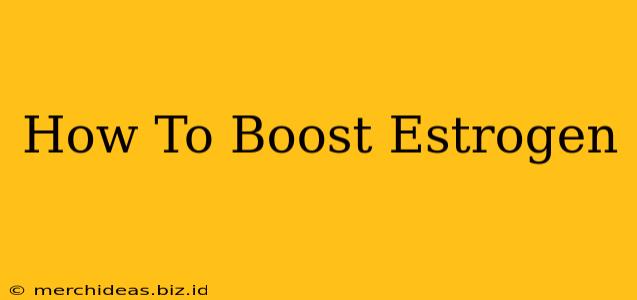Estrogen, a primary female sex hormone, plays a crucial role in women's health, impacting everything from menstruation and fertility to bone density and mood. While estrogen levels naturally fluctuate throughout a woman's life, experiencing low estrogen can lead to a range of unpleasant symptoms. This comprehensive guide explores natural ways to boost estrogen levels, emphasizing a holistic approach that prioritizes lifestyle changes and dietary adjustments. It's crucial to consult your doctor before making significant dietary or lifestyle changes, especially if you suspect an estrogen deficiency.
Understanding Estrogen Deficiency
Before delving into boosting estrogen, it's essential to understand the potential causes of low estrogen. These can include:
- Menopause: The natural decline in estrogen production as a woman approaches menopause is a significant contributor to low estrogen.
- Hypogonadism: This condition affects the ovaries' ability to produce sufficient estrogen.
- Surgical removal of ovaries: Oophorectomy significantly reduces estrogen production.
- Certain medical conditions: Some medical conditions, like premature ovarian failure, can also lead to low estrogen.
- Stress: Chronic stress can disrupt hormonal balance, potentially lowering estrogen levels.
- Poor diet: A diet lacking in essential nutrients can hinder estrogen production.
- Excessive exercise: While exercise is beneficial, overtraining can negatively affect hormone production.
Natural Ways to Boost Estrogen Levels
Rather than relying solely on hormone replacement therapy (HRT), many women explore natural methods to increase their estrogen levels. Here are some effective strategies:
1. Dietary Changes: Fueling Your Body with Estrogen-Boosting Foods
Phytoestrogens: These plant-based compounds mimic the effects of estrogen in the body. Excellent sources include:
- Soy products: Edamame, tofu, tempeh, and soy milk are rich in isoflavones, a type of phytoestrogen.
- Flaxseeds: These tiny seeds are packed with lignans, another type of phytoestrogen.
- Whole grains: Oats, barley, and rye contain phytoestrogens.
- Fruits and vegetables: Apples, berries, and carrots are good sources.
Other Essential Nutrients:
- Healthy Fats: Incorporate foods rich in healthy fats like avocados, olive oil, and nuts. These are essential for hormone production.
- Cruciferous Vegetables: Broccoli, cauliflower, and Brussels sprouts support liver detoxification, which is crucial for hormone balance.
2. Lifestyle Adjustments: Supporting Hormonal Balance
- Manage Stress: Chronic stress significantly impacts hormone balance. Practice stress-reducing techniques like yoga, meditation, or deep breathing exercises.
- Prioritize Sleep: Adequate sleep is vital for hormone regulation. Aim for 7-8 hours of quality sleep each night.
- Regular Exercise: Moderate exercise is beneficial for overall health and hormonal balance. Avoid overtraining.
- Maintain a Healthy Weight: Obesity can disrupt hormonal balance. Maintaining a healthy weight through a balanced diet and regular exercise is crucial.
3. Herbal Remedies: Exploring Natural Options (Consult Your Doctor First!)
Some herbal remedies are traditionally used to support estrogen production. However, it's crucial to consult your doctor before using any herbal remedies, as they can interact with medications or have side effects. Some examples include:
- Red Clover: Contains phytoestrogens.
- Dong Quai: Used traditionally to support women's health.
When to Seek Professional Help
While these natural methods can be helpful, it's essential to seek professional medical advice if you suspect you have low estrogen. Your doctor can perform tests to determine your estrogen levels and recommend the most appropriate treatment plan, which may include HRT or other medical interventions. Don't self-diagnose or self-treat.
Conclusion: A Holistic Approach to Estrogen Balance
Boosting estrogen naturally involves a holistic approach encompassing dietary changes, lifestyle adjustments, and, when necessary, consultation with a healthcare professional. By focusing on these strategies, you can support your body's natural estrogen production and improve your overall well-being. Remember that consistency and patience are key. The journey to optimal estrogen levels is a process, and working with your healthcare provider ensures you take the safest and most effective path.
